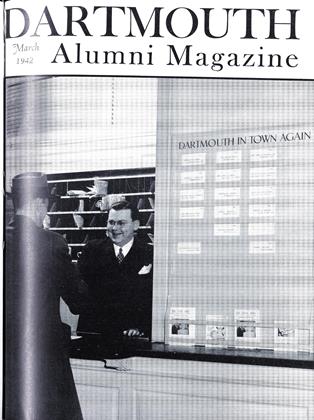IN ITS EDITION of February 12 an editorial by Joseph C. Palameuntain '42, of Lebanon, N. H., editor of The Dartmouth, titled: "A Chance To Lose," appeared in the student daily paper. It is reprinted below:
William L. Batt, director of materials for the war Production Board, bluntly told a New York audience last Friday: "Not since the days of the revolutionhave we ever had much of a chance to losea war. We have a chance to lose this one."
Today the impending fall of Singapore emphasizes every syllable of Batt's understatement. The simple yet deafening, obvious yet unrecognized truth is that we are losing this war.
Strategically, the fall of Singapore increased the danger to the Burma Road and to India, leaves imperiled Java virtually the only United Nations base in the Indies. It increases the likelihood that the remainder of the rich East Indian islands will be the very minimum of what Japan will seize in the next few weeks or months. It means that we have lost a major battle in the Far East. It may mean that we have lost the whole Far Eastern campaign, leaving Japan in an almost impregnable position.
"Too LITTLE TOO LATE" But its meaning extends further. The fall of Singapore, $500,000,000 fortress and "Gibraltar of the East," is another signpost on the road leading to the destruction of all western civilization—a road already well marked by the signposts of the Maginot Line, Dunkirk, and Pearl Harbor. Each signpost, marked with the tragic "too little and too late," proves that bravery alone cannot overcome machines.
The outlook on other fronts is equally ominous. Washington warns that bad news must be expected from the Philippines. After a major African campaign, the British are still no further west than Tobruk; in a winter of hard fighting the Russians have been unable to impair Germany's preparations for a Spring offensive. And that offensive might well be a successful drive through the Middle East into India to meet a Japanese drive, thus cutting off our supply lines to both Russia and China.
We repeat (and shall continue to repeat for as long as is necessary): we are losing this war.
We are losing this war—and yet few of the American people can grasp the fact, complacently preferring to believe that Generals, Winter, Mud, and Typhus are fighting for us and talking of "overextension of supply lines."
We are losing this war—and yet Batt remains the only government leader to publicly admit it.
We are losing this war—and yet some of our Congressmen spend their time and energies attacking fan-dancers and Donald Duck.
We are losing this war—and yet our steel hearths grow cold for want of scrap while old and new steel is plentiful; for want of shipping space our deliveries to our ally, Russia, are only half of what we promised while our carelessness allows the Normandie to be destroyed.
The winning of this war certainly requires courage; it may also require some fear.
 View Full Issue
View Full Issue
More From This Issue
-
 Article
ArticleTrials, Tribulations, Success
March 1942 By RALPH SANBORN '17 -
 Sports
SportsBig Green Teams
March 1942 -
 Class Notes
Class Notes1917*
March 1942 By EUGENE D. TOWLER -
 Class Notes
Class Notes1937*
March 1942 By DONALD C. MCKINLAY -
 Article
ArticleIndians Scout for the Fleet
March 1942 By LT. E. F. PLANK, UNITED STATES NAVAL RESERVE -
 Class Notes
Class Notes1931*
March 1942 By CHARLES S. MCALLISTER
Article
-
 Article
ArticleROLLINS PRIZE SPEAKING CONTEST
January 1915 -
 Article
ArticleMost Recently Completed Panels of the Frescoes in Baker Library
February 1934 -
 Article
ArticleGRADUS AD PARNASSUM
March 1934 -
 Article
ArticleBILL CUNNINGHAM MAKES IT CLEAR
January 1941 -
 Article
ArticleWith the Big Green Teams
MAY 1967 -
 Article
ArticlePRECAUTIONS WELL ORGANIZED IN HANOVER DEFENSE PROGRAM
February 1942 By Robert R. Rodgers '42


